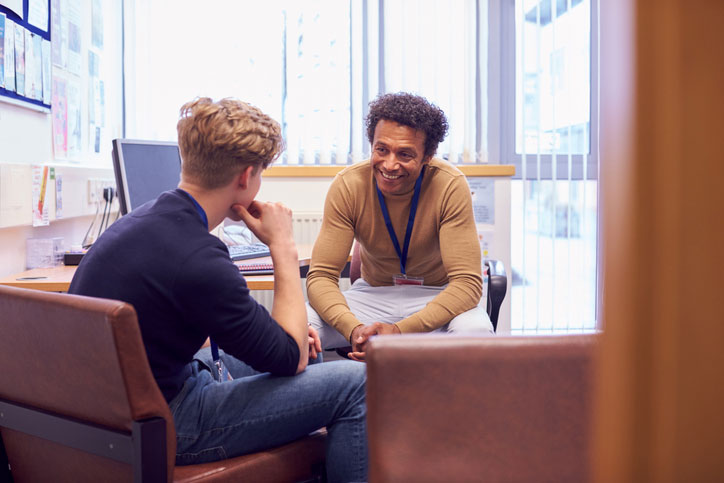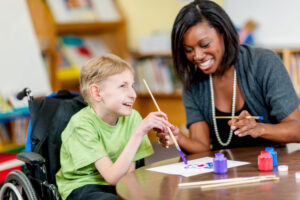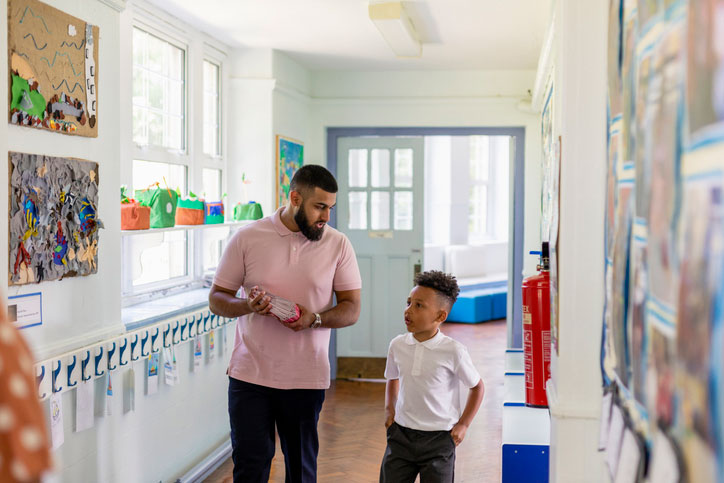Written by Scott Wilson

Although many different social work roles have a focus on helping youth and adolescents, the practice of social work in educational settings demands an even more focused kind of expertise. At the institutions responsible for educating and safeguarding the next generation, society has the first and best shot at setting expectations and offering guidance to turn kids from every background into stable, balanced, successful adults.
The COVID-19 pandemic put school social workers in the spotlight dealing with the challenges of remote education.
The role of a social worker in school settings expanded dramatically in 2020 as the COVID-19 pandemic descended on schools around the nation. New York was hit harder and earlier than most. Social workers found themselves dealing with entirely new kinds of problems as disconnection and distraction overtook remote learning, and socialization and education both suffered.
Perennial issues among New York students stemming from housing and food insecurity, substance addiction and other daily drama on the domestic front, and the specter of online bullying and violence outside the home continue to create stressors for school-aged kids. Those stressors compete for attention and mental focus and have a real impact on students’ ability to thrive both socially and academically.
This confluence of societal issues has introduced an entire generation of kids to all new challenges that can detour them from a normal developmental path. The ongoing effects of this kind of trauma are front and center for the social workers in New York schools. The good news is that they are in the best possible position to help students push past those difficulties and go on to exciting and successful lives.
What Does a School Social Worker Do in New York?
According to the New York State School Social Workers’ Association, the role of a school social worker is to work with students through mental health issues and behavioral concerns, provide academic support, and to be available to consult on all those issues and more with parents and administrators.
School social workers perform a great deal of screening work. They are in a position to be in contact with almost all the children in a school community. This allows them to pick up on both bigger trends and individual concerns within that group. They are trained in assessing psychological, biological, medical, emotional, and sociological considerations. Just as important, it’s a primary part of their job to do so. They are the independent adults in student’s lives whose single major responsibility is to assess and ensure their well-being.
As unbiased professionals who aren’t delivering discipline or grading papers, school social workers are in a unique position to develop trusting relationships with students.
They may do that through subtle guidance offered to teachers, administrators, and parents for kids having difficulty academically or behaviorally. They may also intervene directly in moments of crisis and provide ongoing counseling to put students on a better path for success.
Complexity In the Modern World Makes School Social Workers More Critical In Student Safety Than Ever
In today’s school environment, there are many threats to that success. Modern school social workers in New York are forced to cope with difficult challenges like:
- Substance abuse
- Violence at home or in school
- Cases of neglect and abuse
The constant specter of school shootings hangs over New York as it does other parts of the country, with lockdowns and incidents a regular feature from Rochester to the Bronx. Social workers are in a position to spot warning signs and head-off such tragedies. And in the worst case scenarios they are there to help students cope with the stress and trauma when prevention fails.
While a lot of school social work revolves around these kinds of serious matters, there is a lot of room for more uplifting and even joyous experiences too. School social workers can be the one adult around the school building whose sole concern is the holistic welfare of kids, equally concerned with life at home as they are with what takes place on school grounds. They develop close relationships, act as a mentor, and serve as a trusted resource for those who may not have any other reliable adults in their lives.
It’s a position where you will feel proud each spring as kids you have worked with through a tough year or a few move on and up, closer to the lives they want to live.
For Special Education Students, Social Workers Play an Important Role in Eliminating Barriers
 Special education revolves around providing supports and accommodations outside the mainstream of education that allow special needs students to learn and absorb information on par with their grade level. Those needs will vary from child to child. Social workers seem to have a unique knack for evaluating the individual needs of students and coming up with custom-tailored solutions.
Special education revolves around providing supports and accommodations outside the mainstream of education that allow special needs students to learn and absorb information on par with their grade level. Those needs will vary from child to child. Social workers seem to have a unique knack for evaluating the individual needs of students and coming up with custom-tailored solutions.
As such, New York’s school social workers in special ed play a critical role in developing interventions, supporting positive behavior, and assessing ongoing performance in and out of the classroom as it relates to everything from emotional regulation to social development.
As experts in IDEA (Individuals with Disabilities Education Act) requirements, they also play an important part in advocating for students and explaining the system to both teachers and parents.
Tearing down barriers to ensure every student has access to a full, unencumbered, and appropriate education is a big job, and one that special education teachers and school administrators are glad to share with skilled social workers.
Specialized MSWs Designed Especially for School Social Workers in New York

Since licensure is a must-have for New York school social workers, you’ll definitely be going through a Master of Social Work degree program on your way to the playground.
While any CSWE-accredited MSW that meets New York State Education Department curriculum requirements will qualify you for state licensure, your best bet to prepare for this highly specialized niche is through a concentration that drills down into the specifics of school social work. In New York, you can find degrees such as a Master of Social Work field of practice emphasis in School-Based and School-Linked Services or Master of Social Work Concentration in Social Work in Schools.
It’s often also possible to put together an appropriate course of study with closely related concentrations, such as an MSW in Children & Families or a Master of Social Work in Family, Youth, and Children’s Services.
What you’ll be looking for are courses such as:
- Child Mental Health Services
- Politics in Education
- Engaging and Supporting Family Members With Disabilities
- Sexual and Gender Diversity in Social Work
- Understanding Violence and Abuse in Childhood
These, combined with the generalist curriculum of clinical therapy, advocacy, and social justice courses will set a solid foundation for your practice in New York schools.
An MSW also comes with practical field experience built in. With a concentration in school social work, that field work will almost certainly include placements in a variety of different school environments. You’ll learn on the job from practicing school social workers and deal with real-world situations with kids, teachers, and families.
State Certification Is a Requirement To Become a School Social Worker in New York
In New York, school social work is the only specialized role in the field that requires an additional state certification on top of the standard NYSED LMSW (Licensed Master Social Worker) or LCSW (Licensed Clinical Social Worker) credential:
The School Social Worker Certificate from the Office of Teaching.
This is actually a kind of teaching certification rather than another license. It’s covered under the category of Pupil Personnel Services, along with certificates for school counselors and psychologists.
Most of the requirements for the certificate are naturally met through the process of earning your LMSW. On top of that, however, you’ll need to check a few more boxes:
- Build at least two years of paid, full-time pupil personnel experience. This is usually met in the course of qualifying for a provisional certificate that grants the authority to work in New York schools.
- Attend a 2-hour workshop on child abuse identification
- Attend a 2-hour workshop on school violence intervention and prevention
- Attend a 6-hour workshop on the Dignity for All Students Act
- Get fingerprinted and pass a criminal background check
It’s possible to obtain a provisional certificate while still going through your master’s program and before you obtain your LMSW. This allows you to start building experience even as you are getting your educational qualifications.
A provisional certificate can be obtained that will cover you for five years, which is plenty of time to get your experience requirement fulfilled. Even then, it may be renewed if you need more time.
Professional Certification Demonstrates Mastery in School Social Work Above and Beyond State Requirements
In addition to official state certification, it’s a boost to the careers for many in the field to obtain a third-party professional certification in school social work from the National Association of Social Workers (NASW).
The Certified School Social Work Specialist (C-SSWS) provides an independent evaluation of school social work skills and capabilities in crisis intervention, community organizing, advocacy, and case management.
NASW also offers nationally-recognized professional certs in case management, clinical social work, and youth and family social work that may be worth considering for school social workers.
It’s one of the few NASW credentials you can get without earning the LCSW or LMSW, although in New York you need those credentials anyway. But on top of that, you’ll simply need to document at least 2 years of paid, supervised, post-MSW social work experience in a school setting.
The School Social Work Association of America also offers an option, the National Certified School Social Worker (NCSSW) credential. It doubles the post-MSW experience requirement to 4 years but otherwise has requirements similar to the C-SSW.
School Social Worker Salary in New York
For salary information specific to school social workers in New York, we turn to the US Department of Labor, Bureau of Labor Statistics (BLS). The data that BLS provides is based on salary surveys of actual social workers employed with the New York State public school system and private schools throughout the state, so you can trust the data to be accurate.
Statewide, school social workers in New York earn a salary that ranges from $47,680 at the low end (bottom 10%) on up to $106,690 or higher for the top 10%. In New York City specifically, you’ll find it tracks fairly closely at the low end at $47,280 but is a good bit more among the top earners who earn $114,300 or more, representing the highest salary for school social workers anywhere in the country.
Here we show the salary ranges throughout New York State, from the median to the top 10%. It’s worth noting that the top 10% figure the BLS shows is the baseline for that bracket, so at that level you can expect to earn at least the figure shown.
